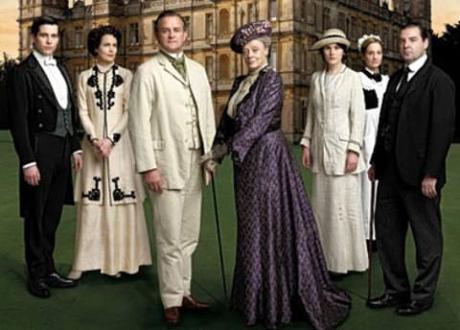
The cast of Downton Abbey
Really, what was on television before Downton Abbey?
Downton Abbey gave American public television broadcaster PBS its highest audiences in years – the second season finale last Sunday saw 5.4 million viewers, the broadcaster’s largest audience in three years – and it has halted the downward slide of its British home, ITV. The sudsy highbrow drama following the lives of the aristocratic Grantham family and their servants in the time before and after the First World War heads is currently filming its third season in Britain, and while British commentators wondered whether the show had jumped the shark in the second season, Downton mania still seems to be going strong.
So, what’s new(ish) with Downton?
No movie, MacLaine on set. Actor Hugh Bonneville, better known to most as Lord Grantham, rubbished rumours this week that the costume drama is headed for a film adaptation; evidently, the ol’ rumor mill began turning after Downton writer and creator Julian Fellowes was spotted (gasp!) chatting with film producers at the Golden Globes this year. Disappointing? Said Sarah at Unreality TV, “I would like to see a Downton movie, but I can’t really see how logistically it could be tied in to the regular show, unless it’s filmed once the show’s run on TV ends.” Meanwhile, American actress Shirley MacLaine is reportedly on set, filming her part as Lady of the house Cora’s wealthy mother; excitement about the new casting addition is high, with most critics gleefully anticipating the barbed banter between MacLaine and Maggie Smith’s Dowager Countess, Grantham’s mother.
Britons like Downton because it’s real. Lavish clothing, bustling servants, a home that could (and does) double as a hospital, it’s so big? Sure, we think the conceits of Downton are a bit outdated – but, says Jane Bagnall at The Montreal Gazette, many of the show’s elements are startlingly au courant: “The class divide so carefully recreated in Downton Abbey is alarmingly current: Large private land holdings, a fixation with aristocracy, an unsettling sexism all seem to have managed the transition from the 1920s impervious to the passage of time and social upheaval.” The ridiculously large house and its lands aren’t so much a thing of the past: According to Bagnall, 70 percent of UK’s 60 million acres are owned by just 0.36 percent of the population, or about 158,000 families. Even the tradition of male primogeniture persists today among the aristo families, she says, while unemployment among women is at a 23-year high. For Canadians and Americans, Downton is pure fantasy – but for some in Britain, it’s documentary.
Downton, the servant “problem” and work experience. Joe Moran, writing at The Guardian, observed that the relationship between servants and their employers was much more complicated than shows like Downton indicate: “Employing servants was far more than a financial contract or even an expression of the class system: rather, it was an emotional minefield, full of resentment, guilt and grudging obligation on both sides,” Moran wrote. And that scenario is strangely echoed today by the debate over work experience and job snobbery – the notion that people in Britain are unwilling to start at the bottom and work their way up. “For years, young people in this country have been fed the rhetoric of meritocratic elitism and social aspiration. Now, older notions of the dignified, vocational nature of ‘service’ are being revived – and not only on Sunday night television.”

